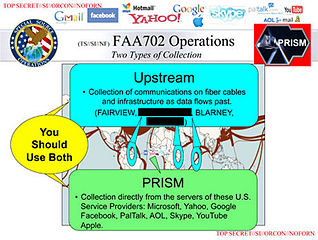Metadata Surveillance, Secrecy, and Political Liberty (Part Two)
Citizen Media Law Project 2013-07-30
Summary:
 (This is the second part of a two-part post. In Part One, Bryce Newell examined the implications of government collection and analysis of metadata relating to electronic communications. Today, Bryce picks up from where he left off, considering the implications of government surveillance under different conceptions of freedom.)
(This is the second part of a two-part post. In Part One, Bryce Newell examined the implications of government collection and analysis of metadata relating to electronic communications. Today, Bryce picks up from where he left off, considering the implications of government surveillance under different conceptions of freedom.)
The International Covenant on Civil and Political Rights (ICCPR), a widely ratified international human rights treaty, includes provisions that relate to liberal and republican conceptions of freedom that are relevant to current discussions about mass government surveillance and communications intelligence gathering. Article 17 of the ICCPR states that, “No one shall be subjected to arbitrary or unlawful interference with his privacy, family, home or correspondence, nor to unlawful attacks on his honour and reputation.” Article 18 guarantees the freedoms of thought, conscience, and religion, and Article 19 guarantees the “right to hold opinions without interference” and the “right to freedom of expression.” The European Convention on Human Rights, an important regional – rather than truly international – treaty, also provides similar protections, as do the constitutions and charters of many other democratic countries. The relevance of these treaties and philosophical accounts of freedom are tied directly to all three of the questions posed in my first post in this series but, I think, they are most interesting when applied to the third question: what transparency and oversight mechanisms ought to govern the collection of communications information by governmental intelligence agencies?
As a starting point, we should seek to identify the oversight mechanisms that are currently in place. In the United States, much of this recently discussed surveillance takes place under the auspices of the Foreign intelligence Surveillance Act (FISA), as amended by the U.S. PATRIOT Act of 2001 and FISA Amendments Act of 2008 (among others). In Canada, the Communications Security Establishment (CSEC) relies on the interconnected provisions of a number of laws, such as the National Defence Act (NDA), the Criminal Code, the Privacy Act, and the Canadian Charter, as well as a number of classified Ministerial Directives (MDs) and Ministerial Authorizations (MAs) that authorize specific activities, including the incidental collection of information about domestic persons. In the United Kingdom, the activities of the Government Communications Headquarters (GCHQ) are regulated by the Regulatory Investigatory Power Act. All of these agencies are restricted in various ways from targeting domestic persons, and their respective security and human intelligence-oriented agency partners (e.g. the CIA and FBI in the U.S., CSIS in Canada, and MI-5 and MI-6 in the UK) and law enforcement agencies are also somewhat restricted in their abilities to collect information about domestic persons without appropriate grounds to do so (e.g. some form of warrant, administrative subpoena, or ministerial authorization).
However, as made clear in recent public congressional hearings and court cases in the United States, much of the legal basis for individual surveillance programs (e.g. the classified decisions of the Foreign Intelligence Surveillance Court (FISC)) remain undisclosed. Federal agencies claim multiple layers of oversight by other agencies (the FISC, Justice Department, and attorney’s in multiple offices), and Congress does get private briefings from intelligence chiefs that are not made public. Canadian intelligence agencies are also subject to oversight by ministers and, in terms of CSEC, to an appointed and independent Commissioner. British intelligence is likewise subject to oversight. The problem, from the
Link:
http://feedproxy.google.com/~r/CitizenMediaLawProject/~3/52FRvzypNkI/metadata-surveillance-secrecy-and-political-liberty-part-twoUpdated:
07/30/2013, 10:36From feeds:
Fair Use Tracker » Current Berkman People and ProjectsBerkman Center Community - Test » Citizen Media Law Project